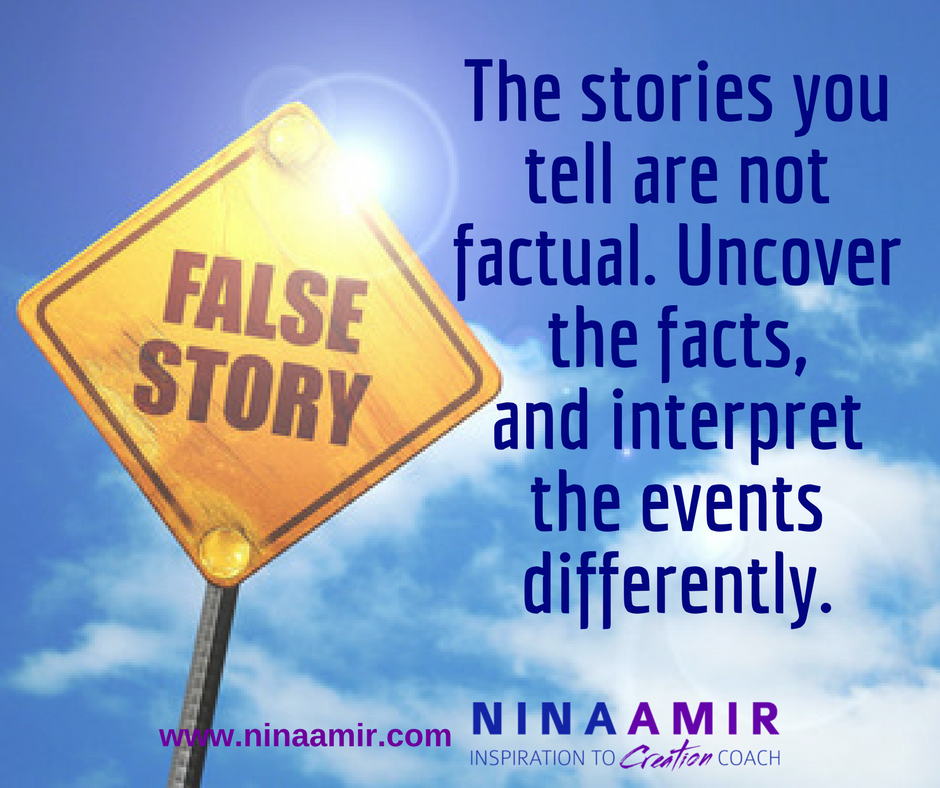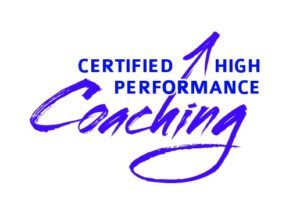 Most of us live a story we have made up. We keep telling it over an dover again even though we don’t always like it. When we excavate the facts from the fiction, we can free ourselves to create a new story that serves us and that we like better.
Most of us live a story we have made up. We keep telling it over an dover again even though we don’t always like it. When we excavate the facts from the fiction, we can free ourselves to create a new story that serves us and that we like better.
How does this “fiction” happen? We interpret our experiences and make decisions based on those interpretations. These decisions become the stories we tell about these events.
And we go through life looking for validation that those decisions and accounts are correct. We accumulate proof that our story is actually nonfiction or based in fact.
But our interpretations are more often than not incorrect. We don’t remember the facts—only our understanding of the events.
And that’s why we live in the story. We don’t know how to distinguish fact from fiction. And we are invested in proving our story is true.
The Many Stories You Tell
If you don’t think you have any stories, think again.
You believe 100% that your interpretation of the experiences of your life is correct. But, in fact, it isn’t. It’s fiction.
You could have stories about just about anything—your relationships, your body, your career or job, your finances, or your ability to create your dreams. Most are incorrect.
Let me provide a few examples from my own life.
Fact vs. Fiction
Here’s a story I’ve told myself for years: When I was seven years old, my father left me.
Here are the facts: When I was seven years old, my father died of a massive heart attack.
He didn’t leave me, even though that’s how it felt. I decided that was what happened. I interpreted the events in that manner.
For most of my life, I’ve found ways to validate that story. In my relationships, men would leave me—physically or emotionally. Even my friends would occasionally leave me, which served to reinforce my belief that the people I love leave.
Here’s another story: When I was in my teens and told my mother I wanted to become a novelist, she said I wasn’t a good enough writer to make a living in this manner.
The facts: When I was in my teens and told my mother I wanted to become a novelist, she said, “Only really good writers can make a living writing books.”
She didn’t say anything about my writing ability. A very practical woman, she just stated her belief about what it took to make earn a paycheck (or pay the bills) as a novelist. I interpreted her words to mean I wasn’t a good enough writer.
And so I become a magazine journalist. And when I decided to write books, I wrote nonfiction books, which I could then monetize in other ways. My success confirmed that mom was right about me and my writing skill.
One time I wrote a novel, and an agent told me the storyline was good but the writing needed help. This provided all the validation I needed to stick to nonfiction. I now had proof; my mother was right about my writing ability.
The Story are You Living
What stories are you living?
Maybe you are living the story that you don’t have enough money and can’t ever save. You don’t ever acknowledge the $500,000 you’ve saved in a retirement account. Instead, you see the pile of bills and the paycheck that pays them and leaves enough over for food…but that’s it. And you tell yourself (and others) all the time that you can’t afford to travel or do the things you’d like because money comes in as fast as it goes out.
Where did you develop your lack consciousness? When you were a young boy, your mom and dad gave you an allowance. Your brother received the same amount of money each month. He always had money left over at the end of the 30 days, but you spent yours long before your parents gave you allowance again. You interpreted this to mean you weren’t good at saving or budgeting funds. And you continue to look for proof that you are bad at managing money…all these years later.
Maybe you want to write a book, but you struggle to write consistently. And each day that goes by without the book written and published, you validate the story that you aren’t a writer. (After all, writers write.)
You Started Writing Fiction in Your Childhood
If you look back at your childhood, you’ll find the facts that created this piece of fiction—and your inability to create and stick to a writing schedule. In middle school, you got involved with the school newspaper. You wrote a piece that was published and read by the other students. And they ridiculed you for that article. They said it was “stupid” and “silly.” You interpreted their opinions and judgments to mean that you were stupid and silly and that anything you wrote would also be stupid and silly. (And you conveniently forgot the fact that you got an award for the article.)
At that moment, you decided that what always happens when you publish work and put it into the world, is that you get ridiculed and judged. So, you avoid that at all costs.
You’ve forgotten entirely—or ignored—proof of the opposite—that award, the papers you wrote in college that your professors raved about, and the article you wrote for an industry publication that received excellent reviews. Instead, you focus on the past—but only the negative proof.
Your Story Lives in the Past
In both these examples, you are living a story that happened in the past and isn’t true today (and never was correct). And you continue to validate it even though you have current proof the story is false.
- You believe you can’t manage money, and find the fact that you have a lot of unexpected bills and save very little as proof.
- You believe anything you write will be drivel, and no one will benefit from reading it. You keep tabs on how often your emails go unread or someone criticizes a report you produce.
In the present:
- You have saved a significant amount of money and never go into debt. Plus, you manage money well daily for yourself—always paying those bills—and as the chief financial officer for a large corporation
- You have much-needed information and expertise to offer to readers. You regularly produce letters advocating for your clients that influence their lives for the better, and your boss tells you often that your reports are well written.
Start looking for proof that you are good at saving or managing money. Find validation that you can write something valuable and useful. Look for facts that prove a different story, a story that serves you.
Current Proof
Remember: Keep the past in the past, especially if you want to craft a new story. For instance, my mother may have said—in the past—that only good writers can make a living as novelists, but she isn’t saying that now. And the decision I made about my ability to write, which was not based on fact but an interpretation of my mother’s words also lives in the past.
Right now—in the present, I can decide to stop believing that I can’t write well enough to succeed. I can choose to look at the proof that I am a good writer—the hundreds of articles I wrote that were published in magazines, the traditional and self-published books I wrote that made it to the Amazon Top 100 List, and the successful blogs I publish. These facts validate that I can, indeed, write.
If I had been looking for this proof earlier in life, I would have found it. It was there in my published work in high school and the local newspaper, for example. But I was looking for proof that I wasn’t a good writer instead.
Start with the Facts
Like a good newspaper journalist, don’t interpret the story of your life. Look for the facts. Collect them all, and then decided what proof you have for one interpretation or another.
Determine the facts about your life, and then you can decide if your stories are fiction or nonfiction. Doing so frees you to see the past, present, and future in a new light. The, you can decide what story you will create about yourself and your life as you move forward.
What stories have you been telling yourself? And what’s the truth? Tell me in a comment below.
Never miss one of my videos! Click here to subscribe to my YouTube channel.
 Do you struggle to become the person you know you can be…the person you want to be and feel certain you were meant to be? It’s time to get out of your own way and get from where you are to where you want to go. Give me an hour of your time, and I’ll help you see how to step into your best self. Apply for a free Certified High Performance Coaching strategy session, and make 2018 your best year ever. To apply for a one-hour FREE Certified High Performance Coaching strategy session, fill out the application at the bottom of this web page .
Do you struggle to become the person you know you can be…the person you want to be and feel certain you were meant to be? It’s time to get out of your own way and get from where you are to where you want to go. Give me an hour of your time, and I’ll help you see how to step into your best self. Apply for a free Certified High Performance Coaching strategy session, and make 2018 your best year ever. To apply for a one-hour FREE Certified High Performance Coaching strategy session, fill out the application at the bottom of this web page .Photo courtesy of Copyright: argus456 / 123RF Stock Photo


Pingback: Decrease Negative Self-Talk to Increase Success - Nina Amir
Hmm.. This is landmark education the forum. Landmark teaches the exact same thing. Fact/Meaning/story.
In fact, Landmark Forum does teach this. So do many, many other personal development teachers and organizations. I’m in a program now that teaches it…but much more effectively. And I had been taught this long before I ever took the Forum several years ago. Who knows where it originated.